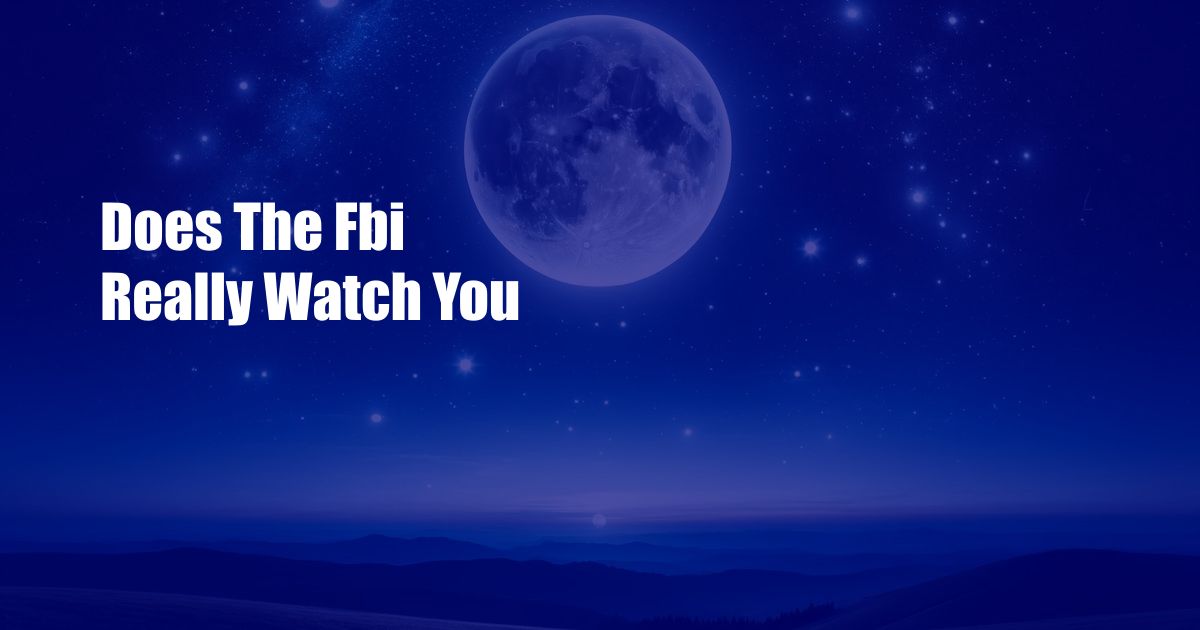
Does the FBI Really Watch You?
In the age of digital surveillance and government overreach, it’s a question that has haunted countless Americans: does the FBI really watch you? While the answer may not be entirely clear, this comprehensive exploration will delve into the complex world of FBI surveillance, its history, methods, and potential implications for privacy.
Since its inception in 1908, the FBI has wielded broad authority to investigate and prosecute federal crimes. In recent years, the agency’s surveillance powers have expanded significantly under the guise of counterterrorism and national security.
FBI Surveillance: History and Evolution
FBI surveillance has its roots in the early 20th century, when the Bureau focused on combating organized crime and anarchism. The rise of the Civil Rights Movement and the Vietnam War era saw an expansion of surveillance as the FBI targeted activists and protesters deemed a threat to national security.
The post-9/11 era ushered in an unprecedented era of surveillance with the passage of the Patriot Act in 2001. This legislation granted the FBI and other law enforcement agencies sweeping new powers to conduct wiretaps, search records, and gather data on individuals, both foreign and domestic.
How Does the FBI Watch You?
The FBI employs a vast array of surveillance methods, both digital and physical. These include:
- Electronic Surveillance: The FBI can intercept phone calls, emails, and social media communications through wiretaps, malware, and data scraping.
- Physical Surveillance: Agents may follow individuals, conduct surveillance on residences or businesses, and use infrared cameras or drones.
- Data Mining and Analysis: The FBI uses algorithms and artificial intelligence to analyze vast amounts of data, including phone records, financial transactions, and social media activity.
Legal and Ethical Concerns
FBI surveillance raises significant legal and ethical concerns, particularly regarding the potential for privacy violations and the erosion of civil liberties. Critics argue that the FBI’s broad powers are subject to abuse and that it has targeted innocent individuals based on religion, political beliefs, or other protected characteristics.
In recent years, several cases have come to light highlighting the potential dangers of unchecked surveillance. In 2013, it was revealed that the FBI had been engaging in “black bag jobs,” breaking into homes and collecting documents and electronic devices without warrants.
Tips to Protect Your Privacy
While it’s impossible to completely eliminate the possibility of surveillance, there are steps individuals can take to protect their privacy:
- Use Encryption: Encrypt your emails, messages, and online data to make it harder for the FBI to intercept it.
- Control Your Social Media: Limit what you share on social media and be aware of the privacy settings you’ve enabled.
- Educate Yourself: Stay informed about FBI surveillance practices and your rights under the law.
By following these tips, you can help minimize the risk of being targeted for surveillance and protect your privacy from potential government overreach.
FAQs about FBI Surveillance
Q: Can the FBI watch me without a warrant?
A: No, the FBI cannot conduct surveillance on individuals without a warrant or other legal authority.
Q: What are the legal limits on FBI surveillance?
A: The FBI’s surveillance powers are governed by the Foreign Intelligence Surveillance Act (FISA) and other federal laws.
Q: Can I get a copy of my FBI file?
A: Yes, you can request a copy of your FBI file under the Freedom of Information Act (FOIA). However, certain information may be withheld for reasons of national security or ongoing investigations.
Conclusion
The question of whether the FBI watches you is a complex one that requires careful consideration of history, legal frameworks, and potential privacy implications. While the FBI has legitimate responsibilities in protecting national security, it’s crucial that these powers are not abused or used to suppress dissent or target innocent individuals.
By understanding the methods and limitations of FBI surveillance, you can make informed decisions about how to protect your privacy and safeguard your civil liberties. If you have concerns about potential FBI surveillance, you should seek legal advice to better understand your rights and options.
Are you interested in learning more about FBI surveillance and its impact on your privacy? Share your thoughts and questions in the comments below.
 TeknoHo.com Trusted Information and Education News Media
TeknoHo.com Trusted Information and Education News Media



